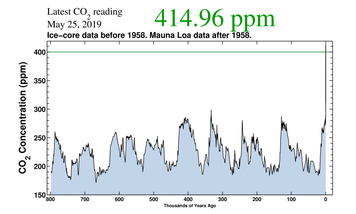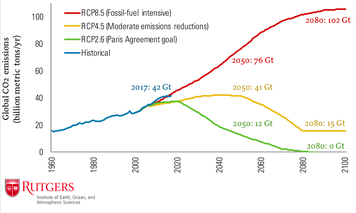The Trump admin really, really doesn’t want you to see this climate science

The same scientific agencies that rocketed Neil Armstrong to the moon and forecast the landfall of hurricanes that pummel the U.S. coast also expect dramatic changes to Earth's climate this century, should humanity continue to heat the planet.
But the Trump administration no longer wants many federal scientists to consider longer-term consequences of saturating the atmosphere with the potent heat-trapping gas carbon dioxide, now likely at its highest level in millions of years.
As The New York Times reported on Monday, the head of the U.S. Geological Survey (USGS) ordered the agency's researchers to only project climate change impacts through 2040, as opposed to the end of the century. What's more, The Times reported that the Trump administration might not include future high carbon emission scenarios (which are quite likely) in forthcoming climate reports, including the congressionally mandated National Climate Assessment — a major report closely reviewed by The National Academies of Sciences, Engineering, and Medicine.
These actions boil down to withholding climate modeling research that's being done at advanced research centers, universities, and government agencies around the nation.
"These models are based on physics that have been developed over the course of a century," said Bob Kopp, an author of the Fourth National Climate Assessment, released in November 2018.
"These are not random number generators. They're analogous to models used to simulate how an airplane flies," added Kopp, who is also the director of the Institute of Earth, Ocean, and Atmospheric Sciences at Rutgers University.
"Models use physics and chemistry to model how the climate behaves with known amounts of greenhouse gases in the atmosphere," noted Sarah Green, a chemist at Michigan Technological University.

Image: scripps institution of oceanography
It's of little surprise that the Trump administration — which has publicly fostered misinformation about climate science and deleted government climate change web pages — would continue its campaign to quell climate science. But for the most interested parties (those inhabiting the Earth in 2040 and beyond) the administration's latest efforts are ever pertinent.
"I intend to survive past 2040 and so I care about future projections," said Kate Marvel, a climate scientist at the NASA Goddard Institute for Space Studies. "Besides, we make lots of investments — homes, infrastructure, insurance policies — that last more than 21 years."
"Climate change won't suddenly stop in 2040," added Marvel, noting that even if global society miraculously stopped burning fossil fuels tomorrow (it won't), carbon dioxide is already loaded in the atmosphere, and it will continue to warm the planet.
"It makes no sense to stop projections in 2040, because the consequences of our emission decisions will play out on a much longer time scale, until the end of this century and beyond," emphasized Stefan Rahmstorf, head of Earth System Analysis at the Potsdam Institute for Climate Impact Research, in Germany. "Cutting these projections off in 2040 would be like sailing into uncharted waters while deliberately putting a highly short-sighted lookout into the crow's nest."
The Trump administration can't stop climate science from advancing outside of government, at research institutions throughout the nation and the greater world, like at Rahmstorf's institute. So the end result of expunging future climate modeling and certain climate scenarios will only serve to weaken congressionally-mandated scientific reports in the U.S. And that may be the administration's plan.
"They don’t want people to look down the road," said Michael Mann, director of the Earth System Science Center at Penn State University. "They hope to impose a dangerous myopia when it comes to the greatest potential threat we face as a civilization."
SEE ALSO: This scientist keeps winning money from people who bet against climate change
To Mann, the reason why is clear. It's "all in the name of record profits for their fossil fuel industry executive friends," he said. Even before Trump took office the U.S oil industry boomed, and now continues to flourish. The U.S. became the world's largest oil producer in 2018, and may now challenge Saudi Arabia as the world's top oil exporter, reports Axios. Meanwhile, a former coal lobbyist heads the Environmental Protection Agency (EPA), a former oil lobbyist leads the Department of Interior, and ardent carbon dioxide advocate William Happer serves on the president's National Security Council.
In short, if the Trump administration has its way, heat-trapping CO2 will pour into the skies. This makes modeling future high-emission carbon scenarios all the more relevant. The National Climate Assessment published a variety of future scenarios that included a "worst case" high emissions scenario commonly called "business as usual," meaning that emissions will continue trending up.
"It’s the policy of this administration to make that scenario more likely," noted Kopp. "They can complain about us evaluating the worst case, but of the scenarios available, it’s the one closest to historical emissions."
The Trump administration does not like this high-emissions scenario, and has repeatedly accused the National Climate Assessment of promoting it over other scenarios, most recently telling The New York Times that it's "inaccurate modeling that focuses on worst-case emissions scenarios." This is easily debunked. The most recent report assessed a number of scenarios from low to high carbon emissions, noted Rahmstorf; no one future scenario is emphasized (see pages 81 and 82).
"It's not true that the climate assessment focused on that [high-emissions] to the exclusion of other scenarios," noted Kopp.

Image: BOB KOPP / ECONOMIC RISKS OF CLIMATE CHANGE: AN AMERICAN PROSPECTUS
If the Trump administration does decide to erase the high-emissions scenario from future National Climate Assessment reports, Kopp notes that the move might be illegal. After all, congressional law clearly states that the report is supposed to look at 25- to 100-year time scales, not just 20 years.
The greatest uncertainty
To climate scientists, the greatest source of climate uncertainty has nothing to do with their understanding of how the carbon dioxide molecule traps heat (a reality known since the 1860s) or how the carbon cycle works.
It's us.
"The biggest uncertainty in modeling future climate is how much greenhouse gases will be emitted by humans," said Green.
"The biggest uncertainty in climate science is human behavior," agreed NASA's Marvel.
"We simply don't know what society's emissions will look like in the future," she said. "But we can make some educated guesses about reasonable scenarios, and explore the climate consequences of those scenarios."
Lines of evidence from around the world #ClimateChange
[Animation from @NASAEarth: https://t.co/U89bHyNxAx] pic.twitter.com/43Dj76Aci5— Zack Labe (@ZLabe) May 24, 2019
Millions and millions of Americans, objectively, have a vested interest in where the climate is headed — even if that potential reality is unenviable. Indeed, it's rife with increased disruptions to the water system, meaning severe drought, wildfires, and pummeling deluges.
It's how the physics of a warming planet works.
Only looking to 2040 can't change physics. But it can shroud scientific information from taxpayers. "They’re trying to hide the disastrous impacts that climate change will have on our children and grandchildren by limiting the projections to only the next two decades," said Mann. "They well know that if we fail to act to bring down our carbon emissions over the next decade, this will lock in disastrous melting of the ice sheets, sea level rise, and a rise in devastating weather extremes down the road."
Under a geologically unprecedented rise in the rate of carbon dioxide levels, extremes are already afoot.
"My son is going to graduate from college in around 2040," said Kopp. "It's irresponsible for the government to say it doesn’t care about the world that he’s going to be graduating into."
"President Trump may not be around then, but a lot of us will be."
WATCH: Ever wonder how the universe might end?


